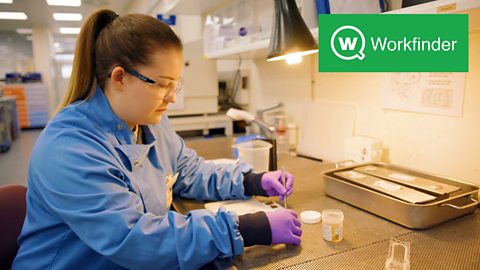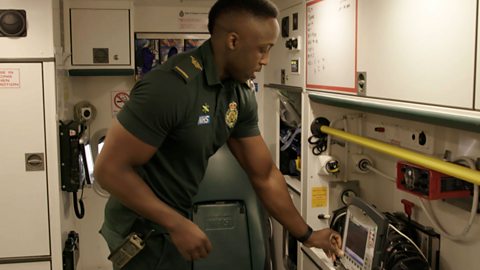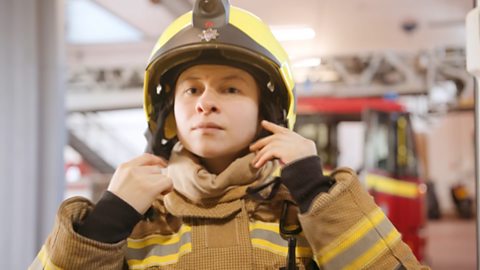Meet Tanoh, 28, and find out about his life as a paramedic in the NHS. Part of our Bitesize world of work series.
Tanoh:I'm Tanoh, I'm 28 years old, and I'm a paramedic.
Every single day is different in this job. It ranges from going out to people with difficulty breathing, people who've been in accidents, or people who suffer with things like chest pain. As a paramedic, it's my responsibility to provide high quality, emergency, pre-hospital care in order to look after the patient and transport them safely to hospital.
In preparation for the shift ahead, I make sure that the ambulance is fit and ready to respond on a 12-hour shift. I make sure we've got all the right medication that I need, all the medical equipment I need such as oxygen, masks, stethoscopes, things to check temperatures, things to monitor blood sugar. One of the things we always have to hand is a defibrillator and basically that's there to help restart someone's heart when they are in cardiac arrest.
The other side of the role is driving under emergency conditions using sirens to make sure that other drivers are aware of what you're doing and where you're going. A high level of teamwork is required on an ambulance. You work with one other person for 12 hours. And even in that time, the two of you can end up assisting other paramedics. A lot of the biology aspects that I did at GCSE and A-level, so human anatomy, human physiology, some pathophysiology, that's all helping me in my current role.
Tanoh's colleague:Tanoh is really good at his job. As a paramedic, he brings many skills, talking to the patients. calming the patients down, making them feel at ease. He's always got my back and I've always got his, he's a good crew mate to work with.
Tanoh:By far the best part of the job is knowing that every day when I come into work, I can make a difference in people's lives. One of the highlights of this job so far is receiving appreciation from a nine-year-old girl who was really happy with the care that I provided for her.
By far the best part of the job is knowing that every day at work I can make a difference to someone.
- In Tanoh's job, he responds to emergency 999 calls
- Because paramedics are often the first people to reach someone in need of medical help, they are trained to give life-saving treatment
- Paramedics work in shifts of 12 hours with a partner, so they need to have excellent teamwork skills
- Tanoh is also responsible for checking the equipment and supplies in an ambulance ahead of his shifts and driving to patients in need of his help.

What to expect if you want to become a paramedic
Paramedic average salary: NHS band 5-6. Read more about . Salaries will differ in private healthcare.
Paramedic typical working hours: 36 to 38 hours per week. You work shifts, which could include evenings, weekends and bank holidays.
What qualifications do you need to be a paramedic?
Typical entry requirements:
- You can train at university by doing a paramedic science degree that is approved by the Health and Care Professions Council (HCPC). Full-time courses usually last three years and typically require two to three A-levels (or equivalent) to secure a place
- You can also get into this role through a paramedic degree apprenticeship. There are no set entry requirements, but having four or five GCSEs (or equivalent) at grades 9 to 4 (A* to C) and college qualifications such as A-levels (or equivalent) may help
- Another option is to start as an ambulance care assistant and, with experience, apply for a place on a paramedic training scheme.If you apply for a training scheme as a student paramedic with an ambulance service, you would do your university paramedic qualification on the job
- You could build experience by volunteering as a community first responder with an organisation like St John Ambulance or an NHS ambulance trust, or by completing a first aid certificate
- Paramedics also drive ambulances. If you're old enough and legally able to do so, learning to drive would be a useful step towards this role.
Check out the NHS Health Careers website for more .
This information is a guide and is constantly changing. Please check the website for the latest information and all the qualifications needed. (Sources: LMI for All, National Careers Service, NHS Health Careers).
For careers advice in all parts of the UK visit: , , and .
For careers advice in all parts of the UK visit: , , and .

Job progression
Once you are an experienced paramedic with additional skills and qualifications, you can develop into other roles that allow you to carry out more treatments and take on more responsibility. There are many opportunities for experienced paramedics to develop into more senior roles such as a specialist paramedic, advanced paramedic or consultant paramedic. See for further information.


Find work experience placements with Workfinder.
Tips and advice
Help with interviews, writing a CV and all things work experience related.


Khadija: StreetDoctor intern
Khadija volunteers for StreetDoctor to help build up her medical experience.

A collection of paramedic job profiles and information about what the role entails.

Izzy: firefighter. video
Izzy works as a firefighter in London.
